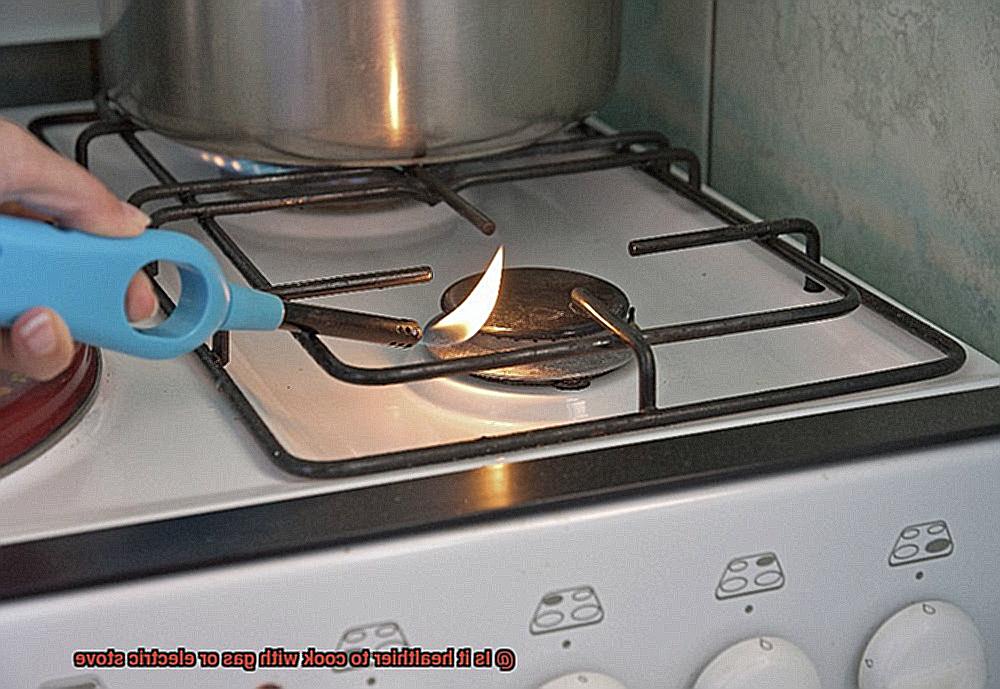Have you ever considered the impact your cooking appliances could have on your health? It’s not a topic that comes up in everyday conversation, but it’s worth exploring. After all, we use our kitchen appliances every day, and their effects on our health could be significant. The question is: is it healthier to cook with gas or electric stove?
To answer this question, we need to consider several factors such as air quality, energy efficiency, and safety concerns. Gas stoves can release harmful pollutants into the air while electric stoves produce fewer emissions. On the other hand, gas stoves are more energy-efficient than electric ones. Electric stoves have an advantage when it comes to safety since they don’t have an open flame.
However, there’s no clear-cut answer to this debate since individual preferences and cooking styles play a role. The materials used in your cookware also matter. So if you’re curious about the health effects of cooking with gas or electric stoves, keep reading – we’ve got you covered.
Contents
What is a Gas Stove?
Gas stoves are a staple in many kitchens, providing a reliable and efficient way to cook food. But what exactly is a gas stove? Simply put, it’s a cooking appliance that uses natural gas or propane to heat the burners, which then transfer the heat to pots and pans.
One of the biggest advantages of using a gas stove is its quick heating time and precise temperature control. This makes it ideal for cooking foods that require high heat, such as searing meat or boiling water. And unlike electric stoves, gas stoves cool down quickly as well, giving cooks more control over the cooking process.
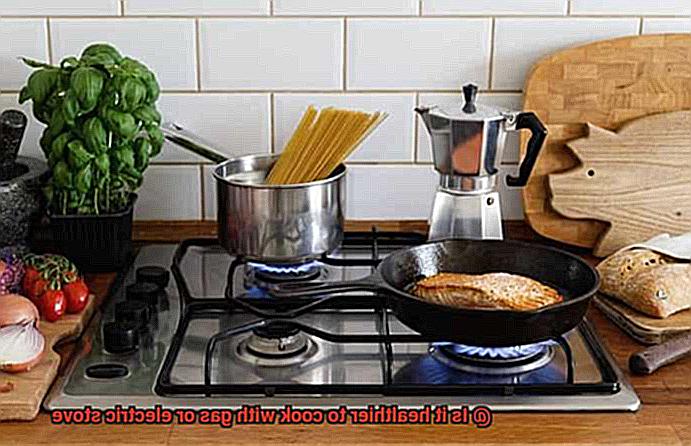
But that’s not all – gas stoves are also known for their even heating, which means that food is cooked consistently and evenly. This makes them a favorite among chefs and home cooks alike. And when it comes to cleaning, gas stoves are relatively easy to maintain. The burners can be removed and cleaned separately, allowing for a thorough cleaning. In addition, spills and splatters on the stovetop can be wiped away easily with a damp cloth.
However, there are some potential downsides to consider when using a gas stove. Gas stoves can produce combustion byproducts such as carbon monoxide and nitrogen dioxide, which can be harmful if not properly vented. It’s important to have a well-ventilated kitchen when using a gas stove to prevent these byproducts from accumulating.
Another risk associated with gas stoves is the potential for fire if they are not used properly or if there is a gas leak. To avoid accidents, it’s important to follow proper safety precautions when using a gas stove.
When deciding between a gas or electric stove, it ultimately comes down to your personal needs and lifestyle. Gas stoves offer quick heating and precise temperature control but require proper ventilation and safety precautions. Electric stoves, on the other hand, are easy to clean and maintain but may not heat up as quickly or evenly as gas stoves.
What is an Electric Stove?
An electric stove is a kitchen appliance that heats up cooking elements on the top of the stove by using electricity. But there’s more to it than that.
Electric stoves come in two types, coil-top and smooth-top models. The coil-top model has exposed metal coils that heat up, while the smooth-top model has a sleek glass surface with heating elements located underneath. Which one is best for you? That depends on your personal preference and cooking needs.
One of the biggest advantages of electric stoves is their ease of cleaning. Without grates or burners to remove and clean, you can quickly wipe down a smooth-top model or clean the metal coils of a coil-top stove.
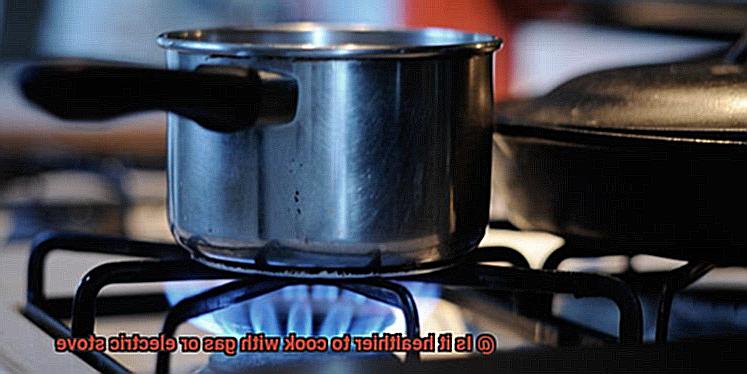
Electric stoves are also safer to use than gas stoves, as there is no open flame or combustible gas present. This reduces the risk of accidents and makes them an ideal option for households with children or pets.
Another advantage of electric stoves is their quick heating times, which saves you time when cooking. However, they tend to be more expensive to operate since electricity is generally more expensive than gas.
It’s important to note that electric stoves may not provide the same level of precision temperature control as gas stoves. Gas stoves allow for instant changes in temperature, while electric stoves may take longer to adjust.
Advantages of Using Gas Stoves
Gas stoves have been a go-to choice for chefs and home cooks for many years. They offer numerous advantages over electric stoves, making them a popular option for those who value efficiency, precision, and reliability in their kitchen appliances.
One of the primary benefits of gas stoves is their efficiency. Unlike electric stoves, which require a lot of energy to produce heat, gas stoves use natural gas or propane as their fuel source, which burns cleaner and more efficiently. This translates into lower energy bills and a more environmentally-friendly cooking experience.
Another significant advantage of gas stoves is their precise temperature control. With instant heat and precise temperature knobs, you can ensure that your food is cooked to perfection every time. This feature is particularly useful when cooking delicate dishes like soufflés or custards that require specific temperatures to cook correctly.
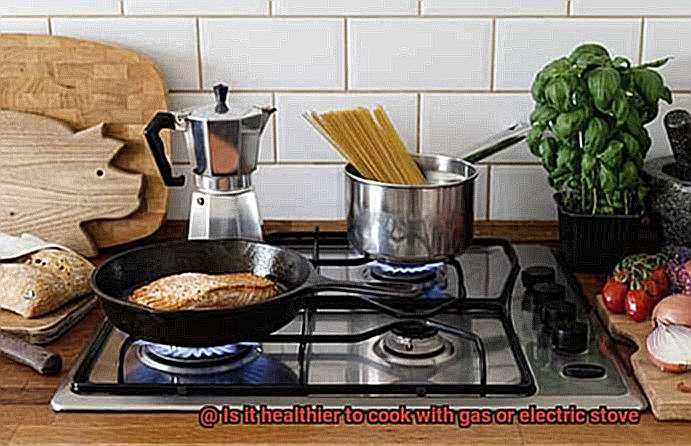
Furthermore, gas stoves are easier to clean than electric stoves. The burners on gas stoves can be easily removed and wiped down, while electric stoves have heating elements that can become dirty and difficult to clean. This makes gas stoves a more practical option for those who don’t want to spend hours scrubbing their appliances.
Lastly, gas stoves are more reliable during power outages. As they do not rely on electricity to operate, you can still cook your meals even when the power goes out. This feature is particularly useful for those living in areas with frequent power outages, where having a reliable cooking source is vital.
Disadvantages of Using Gas Stoves
However, it’s important to highlight the potential drawbacks of using one. Let’s explore some of the reasons why a gas stove might not be the best option for your kitchen.
First and foremost, gas stoves can produce harmful pollutants like carbon monoxide and nitrogen dioxide. These pollutants pose a significant risk to human health, especially if your kitchen is poorly ventilated. Ensuring proper ventilation is crucial to avoid dangerous exposure to these contaminants.
Another disadvantage of gas stoves is their increased fire hazard due to the presence of open flames. Flammable materials like oil or grease can easily ignite, leading to fires. Additionally, gas leaks can occur, resulting in deadly explosions or fires. Prioritizing safety measures when using a gas stove is essential to avoid accidents.
Gas stoves also require regular maintenance to function properly. Cleaning the burners and grates is necessary to prevent clogs that can affect performance, and professional servicing may be required in case of breakdowns. This maintenance can be time-consuming and expensive, making it an important factor to consider.
Lastly, gas stoves tend to use more energy than electric stoves, resulting in higher energy costs. This is due to heat loss and inefficiency caused by direct emission of heat onto cookware. While gas may be cheaper than electricity, the increased energy usage can offset any cost savings.
Advantages of Using Electric Stoves
If you’re in the market for a new stove, you may be wondering whether to go with an electric or gas stove. While gas stoves have been the traditional choice for decades, electric stoves have become increasingly popular in recent years. In this article, we’ll explore the advantages of using electric stoves over gas stoves.
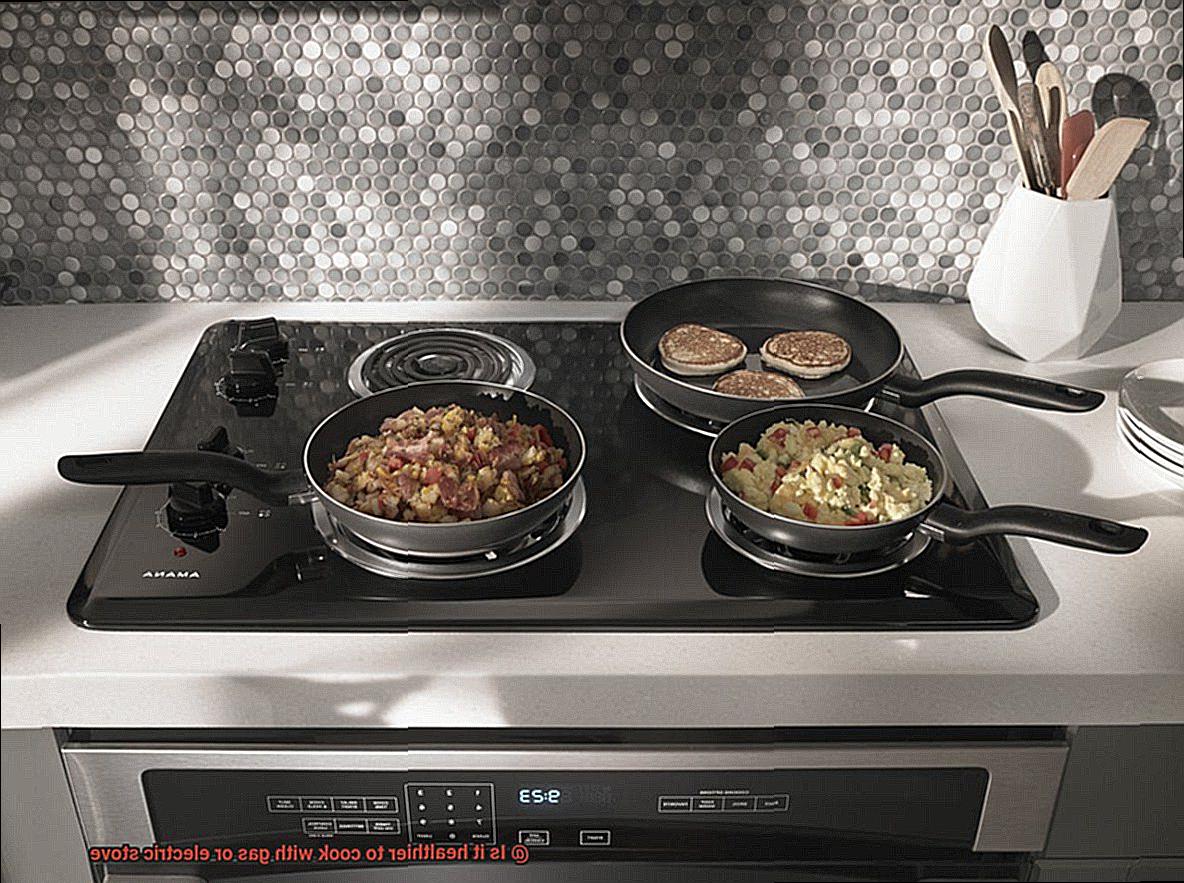
First up, let’s talk about cleaning. With an electric stove, cleaning is a breeze. The flat and smooth surface of an electric stovetop makes it easy to wipe clean with a damp cloth. On the other hand, gas stovetops have burners with grates that can collect grease and food particles, making them harder to clean. So if you’re someone who values cleanliness and convenience, an electric stove might be the way to go.
Next up, speed matters. Electric stoves heat up faster than gas stoves due to their heating element that quickly heats up and distributes heat evenly across the surface of the stove. This means that you can start cooking your meals faster and more efficiently. In contrast, gas stoves require time to ignite the flame, and the heat is not distributed as evenly as electric stoves. So if you’re someone who likes to get things done quickly, an electric stove might be the perfect fit for you.
When it comes to safety, electric stoves are generally considered safer to use than gas stoves. Gas stoves can pose a risk of gas leaks or explosions if there is a malfunction in the gas line or stove itself. Electric stoves do not use gas, so there is no risk of gas leaks or explosions. Additionally, electric stoves usually have safety features built into them, such as automatic shut-off switches that turn off the stove if it overheats or is left on for too long. So if you value safety and peace of mind when cooking in your kitchen, an electric stove might be the way to go.
Lastly, let’s talk money. Electric stoves are more energy-efficient than gas stoves. Electric stoves convert almost all of the energy they use into heat, whereas gas stoves lose some energy through the combustion process. This means that electric stoves are more cost-effective in the long run, as they use less energy to produce the same amount of heat as a gas stove. So if you’re someone who values saving money and being environmentally friendly, an electric stove might be the perfect fit for you.
Disadvantages of Using Electric Stoves
Firstly, electric stoves have a slower response time compared to gas stoves. They take longer to heat up and cool down, which can make it difficult to achieve precise cooking temperatures. This is especially true if you’re an adventurous cook who likes to experiment with different techniques.
Secondly, electric stoves tend to be less energy-efficient than gas stoves. Although newer models are becoming more efficient, they still use more energy overall than gas stoves. This can result in higher electricity bills for those who cook frequently.
Thirdly, electric stovetops can be more difficult to clean than gas stovetops. The smooth surface of electric stovetops shows every spill and stain, requiring special cleaners and more elbow grease than cleaning a gas stovetop.
Lastly, the heat produced by electric stoves may not distribute evenly and consistently across the entire surface of the cookware. This can be particularly noticeable when cooking with large pots or pans.
Despite these disadvantages, electric stoves still have their advantages. They’re safer to use in certain situations and generally easier to operate. However, it’s important to consider these downsides before making a final decision, especially if you’re a serious cook or looking to save on energy costs.
What Type of Cookware Should You Use?
Cooking is an art that requires the right tools. When it comes to cookware, the type you choose can make a significant impact on your health. With a variety of options available, it can be difficult to know which type to use. As an expert in this field, I’m here to help guide you through the advantages and disadvantages of different types of cookware and their implications for your health.
Let’s begin with stainless steel, a popular choice due to its durability and easy-to-clean surface. However, it’s not an excellent conductor of heat, which can lead to hot spots and uneven cooking. Additionally, some stainless steel cookware may contain nickel, which can trigger allergic reactions in some people.
Cast iron is another tried-and-true option that’s been used for centuries. It’s known for its excellent heat conductivity and even cooking temperatures. However, cast iron requires seasoning and proper care to prevent rusting and maintain its non-stick surface.
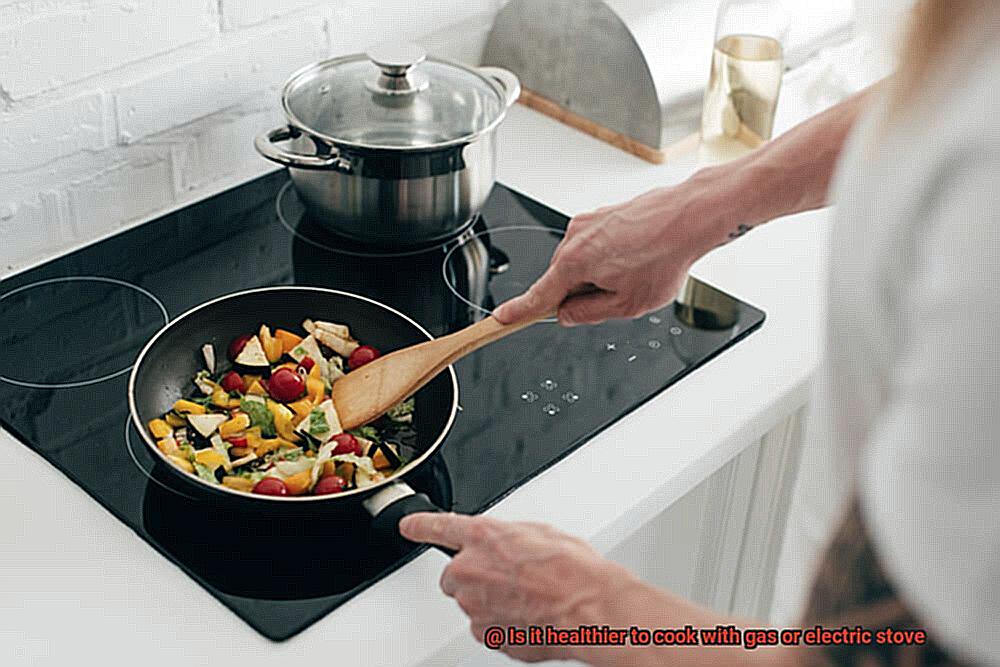
Non-stick cookware has become increasingly popular due to its convenience and ease of use. However, non-stick coatings may contain harmful chemicals like perfluorooctanoic acid (PFOA) and polytetrafluoroethylene (PTFE), which can be released into food when heated at high temperatures.
Ceramic cookware is a newer option that’s gaining popularity for its non-toxic properties. Made from natural materials, ceramic does not contain harmful chemicals. However, ceramic cookware may be prone to chipping or cracking if not handled carefully.
When selecting healthier cookware options, it’s essential to consider the material used in its construction. Stainless steel and cast iron are good options, but it’s important to ensure they are free from harmful chemicals. Non-stick cookware should be used with caution due to the potential release of harmful chemicals when heated at high temperatures. Ceramic cookware is a safe and non-toxic option; however, it requires careful handling to prevent damage.
ivgmSnhS4G8″ >
Conclusion
To sum it up, the question of whether gas or electric stoves are healthier to cook with is a complex one. Each option has its upsides and downsides, and your cooking style and personal preferences play a significant role in determining which is best for you. Gas stoves offer speedy heating and precise temperature control, making them perfect for preparing delicate dishes that require specific temperatures. Additionally, they’re more energy-efficient than electric stoves and easier to clean. However, gas stoves can emit hazardous pollutants like carbon monoxide and nitrogen dioxide, posing health risks if not correctly ventilated.
In contrast, electric stoves are safer to use since they don’t have an open flame or combustible gas present. They also heat up faster than gas stoves and are generally more energy-efficient. However, they tend to be less precise in temperature control than their gas counterparts and may not distribute heat evenly across large pots or pans.
When it comes to selecting healthier cookware options, the material used in construction is crucial. Stainless steel and cast iron are excellent choices; however, ensure they’re free from harmful chemicals like nickel. Non-stick cookware should be used with caution due to the potential release of harmful chemicals when heated at high temperatures. Ceramic cookware is a safe and non-toxic option but requires careful handling to prevent damage.
Ultimately, deciding between a gas or electric stove depends on your unique needs and lifestyle.

